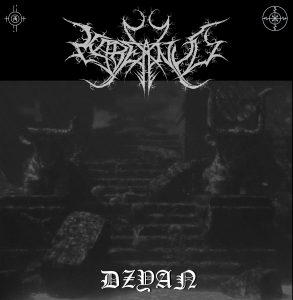
There is no religion higher than truth…
My first acquaintance with Kabexnuv (the band is named after one of Horus’ sons, Qebehsenoef) was when Bud Metal Records did release a split with Brazilian one-man army Dol Guldur. As soon as I noticed that this was another outfit by Avitas frontman Myrtroen, I was sort of prejudiced, but it was not just another coincidental masterpiece. In 2016, I received (and reviewed) the compiling EP Crypt Of The Black Solar Order (both Kabexnuv releases, as well as some for Avitas, can still be consulted, if interested – just enter those monikers in the ‘search’ section). It made me crave for more – and here it is, finally, the newest Kabexnuv epic, named after the Book Of Dzyan. It’s a scripture on ritual principles, coming from a theosophical movement from Tibet, gathered under the working title of The Secret Doctrine by Ukraine-born Helena Petrovna Blavatsky. The initial principles are based on so-called stanzas, seven concepts that deal with the origin and the creation of the Cosmos. And dixit Myrtroen, he tried to achieve the essence of that philosophy through channelling this new album via an aural expression, like a cosmogenic expression, or definition, of that esoteric principle.
This material was recorded over a period of just a couple of days in early September 2017 at the Odin’s Den Studio, completed in its final mix at 2017’s autumnal equinox. The material is available via Myrtroen’s own label Bud Metal Records via digital sources, and Kult Of Medusa Productions taking care of the extremely limited release on tape (nineteen hand-numbered copies only). The seven chapters clock almost fifty minutes and comes with fine artwork.
Those trusted with Kabexnuv’s former material won’t be surprised that Myrtroen strongly continues the trend set with both former recordings. At first, the sound is within the very same vein. It means that the cavernal production is ultimately raw and unpure. Especially the guitar sound is so roughly recorded, strengthening the occult and ritual atmosphere of this project’s concept. In general, the mix is all right, with bass lines, rhythm guitars and drums decently presented, though some strings might seem little under-produced (the semi-acoustic ones, for example, as well as some percussion elements). But above all, the vocals are top-notch, sound-wise. They are like ‘hollow’ and ‘distant’, yet it does fit, it really does. If I should give another (minor) detail on the overall sound quality, it might be the noise at the background, which takes away some of the subtleties, and that’s a pity.
The compositions are well written, nicely executed and strongly varying, yet with a coherent direction. The opener Seven Sublime Lords immediately proves the qualities of the guy behind this project. Old styled and universal Morbid Black Cult confronts you with a message of ritual darkness, going for both the execution and sound, as well as the spheres involved. The slowed-down riffage is like mesmerizing, subtly balancing in between hypnosis and suffocation. Other tracks, like Dzyu Becomes Fohat or Ceaseless Eternal Breath, are like raw manifesti of Epic Pagan pride, fierce and fearless, marching towards victory. Especially within Ceaseless Eternal Breath, I adore the strange, little cosmic guitar riffs, a subtle detail like a siren, a warning of evilness to come. Here too the guitars carry the whole package, nicely and heavily supported by that bold, massive rhythm section, the latter also coming to an orgiastic peak within the slower passages (like towards the end of this song). These slower movements appear several times, covering the atmosphere in a nebula of mysticism and oppression. And I can’t help stopping to think of the earliest recordings of Samael (pre-Worship Him era), with that sludging guitar sound, those ghostly vocals, and the construction of the tempo (cf. a piece like Cold Flame). With The Formless Square, Kabexnuv enter the division of ambient elegance, at least if it were for the (semi) acoustic guitars and synths evolved. Burzum’esque riffing reminds of the coldness and grimness of the Nordic-styled supremacy from the Northern Hemisphere (although acts like Striborg play within my thoughts too, and they are from the Southern Underworld…), and this track consists of more emotion (!) than any track ever done before, somewhat touching the border of the DSBM-scene (!). Like A Thread Through Many Levels is comparable in song writing, performance and atmosphere, even though it’s much more occult and somewhat astral (great spoken words, by the way). This last track might be considered like the most ideal chapter to end this seven-piece concept with.
